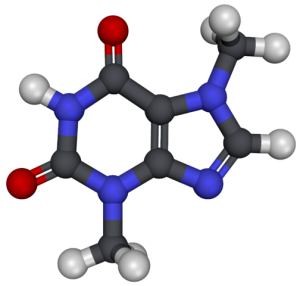Some claim that theobromine works as a milder version of caffeine, but research says otherwise.

- Improved mood and cognition. Theobromine is suggested to work similar to caffeine by enhancing mood, focus, and energy, but research has yet to find any nootropic benefits.
Overview
Theobromine is a bitter-tasting compound present in high levels in the cocoa plant (Theobroma cacao). Theobromine is structurally similar to caffeine, and has similar – albeit far less potent – stimulating effects. The major effects of theobromine include:
- Blood vessel dialtion
- Increased urination (diuretic)
- Widening of the airways
- Increased heart rate
As a supplement, theobromine is mainly used as a pre-workout stimulant replacement for caffeine. In addition, it is also sometimes used as a nootropic due to the claims that it can enhance mood and cognition. However, these benefits remain anecdotal and are not currently supported by research.

How Theobromine Might Help With Brain Health
Inhibition of phosphodiesterases and adenosine receptors
Theobromine is theorized to work similar to caffeine by inhibiting phosphodiesterases, a family of enzymes that break down cAMP, an intracellular messenger molecule that may affect brain function. In addition, it may also block adenosine receptors – the main way that caffeine exerts its invigorating effects.2
Theobromine’s Potential Nootropic Benefits & Uses
As a nootropic, theobromine is primarily used as a milder alternative to caffeine. People who take theobromine claim to experience improved mood, focus, and mental energy without the jitteriness that is often associated with caffeine. However, what little studies have been done on theobromine concluded that it has no effects on mood or cognition. As such, it may be that its cognitive effects are too mild and inconsistent.
Some people have also suggested that theobromine and caffeine can have synergistic effects on mood and cognition, but this claim is not backed by research.

Research
Human Research
Limited research on theobromine indicates that it does not have any nootropic effects.
Theobromine does not seem to affect mood or cognition
The goal of this study was to examine the effects of theobromine and caffeine on mood, cognition, and blood pressure. Twenty-four women were given placebo, theobromine (700 mg), caffeine (120 mg), or a combination of the two. Unlike caffeine, theobromine did not have any significant effects on mood or cognition.
- The researchers concluded that “…theobromine and caffeine could have differential effects on mood and blood pressure.“4
Theobromine does not appear to have psychoactive properties
This study examined the psychoactive effects of theobromine. Eighty healthy people were given varying doses of theobromine (250, 500, 1000 mg) or caffeine (200 mg). The study found that while theobromine increased heart rate in a dose-dependent manner, it did not have any significant psychoactive effects, and actually resulted in decreased alertness and response time at the highest (1000 mg) dose.
- The researchers concluded that “we found that theobromine generally lacked caffeine-like self-reported effects despite our use of a broad range of theobromine doses and a relatively large sample size of individuals“5
Nootropic Dosage
- Successful studies have used doses ranging from 250 to 1000 mg
- Theobromine supplements typically provide doses of 250-500 mg
Available Forms
- Similar to caffeine, theobromine is most commonly sold as a white powder by itself or inside capsules.
- Chocamine®, a branded cacao extract used primarily in nootropic products that contains caffeine, theobromine, and other chocolate compounds.
Supplements in Review Says
- Theobromine 250-500 mg as a nootropic.
Research says theobromine has no nootropic effect. Available research has concluded that theobromine does not affect mood or cognition. But considering that only a handful of studies have been done, we’re not entirely ruling out the possibility that theobromine may have very mild cognition-stimulating effects.
A 250-500 mg dose seems ideal. Because low doses seem to have little to no impact, while high doses (1000+ mg) may have negative effects, 250 – 500 mg seems to be the ideal range.
Leave a Reply